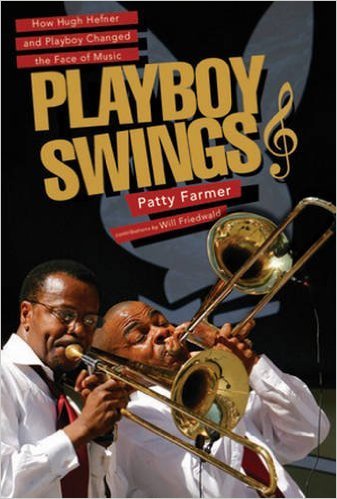As American society nears a demographic tipping point whereby whites are no longer the majority, a culture built upon a straight white patriarchy is facing increased challenges. In 2011, California's Governor Jerry Brown signed the Fair, Accurate, Inclusive, and Respectful Education Act into law, a "first in the nation" bill that requires public schools to:
Meanwhile, women in the arts have become increasingly outspoken about the blatant misogyny and gender bias they face in the entertainment industry.
As the #BlackLivesMatter movement has continued to gain momentum, it's been surprising to see how two prominent white men used their wealth to help strengthen the careers of African American artists. In her new book entitled Playboy Swings: How Hugh Hefner and Playboy Changed the Face of Music, Patty Farmer describes how Hugh Hefner (a life-long jazz enthusiast) helped to open doors for African Americans during the civil rights era.
![2015-10-02-1443822582-3752138-rosenwald1.jpg]()
Cover art for Patty Farmer's new book, Playboy Swings:
How Hugh Hefner and Playboy Changed the Face of Music
A new documentary by Aviva Kempner shines a bright and loving light on a relatively unknown Jewish philanthropist whose generosity helped to build the careers of numerous African American artists while giving an even greater gift to black children growing up in the South. The filmmaker first heard of Julius Rosenwald while attending a speech given by Julian Bond (whose father had worked for The Rosenwald Fund). "When he mentioned that the Sears president helped build 5,000 schools, I almost fell out of my chair," she recalls. "Rosenwald is the greatest American philanthropist you've never heard of!"
Julius Rosenwald was born in Springfield, Illinois and grew up in a house across from Abraham Lincoln's home. Not only had his uncles clothed Lincoln, one of them escorted the dead President's casket back to Springfield following
- Teach the contributions of gay, lesbian and disabled people in social studies lessons.
- Adopt a set of classroom material guidelines that prohibit "pejorative descriptions" based on sexual orientation and gender identity.
- Prohibit the adoption of any materials that reflect adversely on gays or particular religions.
Meanwhile, women in the arts have become increasingly outspoken about the blatant misogyny and gender bias they face in the entertainment industry.
- On March 15, 2010, Theresa Rebeck delivered a scathing, fact-laden speech entitled A Thousand Voices (which was nothing less than a feminist call to arms) to an audience of theatre professionals gathered at the Laura Pels Theatre.
- Melissa Hillman (the Artistic Director of Berkeley's Impact Theatre) has consistently blogged about the impact of institutionalized racism and sexism in theatre circles (especially with regard to the casting process) on her superb blog entitled Bitter Gertrude.
- Lauren Duca recently published an article in The Huffington Post entitled Theatre Needs To Pay A Lot More Attention To Female Playwrights.
- Earlier this year, Lynne Meadow (the artistic director of the Manhattan Theatre Club) came under fire when it was revealed that seven out of the eight plays scheduled for MTC's 2015-2016 season had been written by men.
- Julie Bloom recently published a probing piece in The New York Times entitled Actresses on the Stubborn Sexism of Hollywood.
- An initiative begun by 50 professional theatre companies located in and around Washington, D.C. has resulted in the creation of the Women's Voices Theatre Festival. Their stated goal is "to present at least one world-premiere play by a female playwright during the six-week period between Labor Day and Halloween."
- San Francisco's Magic Theatre and Berkeley's Shotgun Players have built their entire 2015-2016 seasons around the works of female playwrights.
- Meryl Streep has been an outspoken champion of The National Women's History Museum.
As the #BlackLivesMatter movement has continued to gain momentum, it's been surprising to see how two prominent white men used their wealth to help strengthen the careers of African American artists. In her new book entitled Playboy Swings: How Hugh Hefner and Playboy Changed the Face of Music, Patty Farmer describes how Hugh Hefner (a life-long jazz enthusiast) helped to open doors for African Americans during the civil rights era.
- In August 1959, Hefner donated the first day's gross receipts from the Playboy Jazz Festival to the NAACP and the Chicago Urban League.
- In 1962, Miles Davis was the first person to be interviewed in Playboy Magazine.
- Hefner frequently invited African American musicians to perform on his television shows.
- He also insisted that his Playboy Clubs be open to everyone, including African Americans.

Cover art for Patty Farmer's new book, Playboy Swings:
How Hugh Hefner and Playboy Changed the Face of Music
A new documentary by Aviva Kempner shines a bright and loving light on a relatively unknown Jewish philanthropist whose generosity helped to build the careers of numerous African American artists while giving an even greater gift to black children growing up in the South. The filmmaker first heard of Julius Rosenwald while attending a speech given by Julian Bond (whose father had worked for The Rosenwald Fund). "When he mentioned that the Sears president helped build 5,000 schools, I almost fell out of my chair," she recalls. "Rosenwald is the greatest American philanthropist you've never heard of!"
Julius Rosenwald was born in Springfield, Illinois and grew up in a house across from Abraham Lincoln's home. Not only had his uncles clothed Lincoln, one of them escorted the dead President's casket back to Springfield following